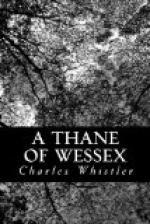At first he denied all knowledge of carnal warfare, but I reminded him of his reading of Beowulf, saying that, if he knew naught of fighting, the verses would have had none of that fire in them. So, in the end, they went to it, and I saw that Guthlac was well used to sword play, and was satisfied also with his pupil.
Then I asked Guthlac whence he got his skill in arms, and why he was shut up thus inside four walls.
“Laziness, Thane,” he answered, telling me nothing of the first matter at all. Nor would he. But I found afterwards that he had been lamed once, and tended by the monks, and so had bided in the abbey, liking the life, though he had been a stout housecarle to some thane or other.
Then Wislac must ask him if there were any more of his sort in the abbey, and seeing that we meant no harm, and looking on me as an ally in that matter of the reading, he said there were five more, “whom Heregar the Thane knew, if he would remember, reading certain Scriptures at supper time.”
And I found that these six kindred spirits had managed to get themselves told off to amuse me while I waited that day, so that they might hear of the fighting.
So we laughed and rode out, and I thought no more of Guthlac and his brethren till the time came when I remembered them gladly.
All day long during that week came pouring in the Dorset levies in answer to the bishop’s summons. Hard and wiry men they were, and as I could well see, a very much harder set than Osric’s first levy, for these were veterans. Ealhstan’s word had gone out that all men who would wipe out the defeat of Charnmouth should gather to him, and these were the men who had fought there, and only longed to try their strength again against their conquerors of that disastrous day.
Day by day, also, would Ealhstan go out into the marketplace, and there speak burning words to them, bidding them remember the days gone by, and the valour of their fathers who won the land for them, and to have ever in mind that this war was not of Christian against Christian, but against heathen men who were profaning the houses of God wherever they came.
Many more things did he say, ever finding something fresh wherewith to stir their courage, but ever, also, did he bid them remember how the Danes had won by discipline more than courage, and to pay heed to that as their leaders bade them.
Also, day by day, he bade the thanes who had seen fighting, train their men as well as they might, and they worked well at that. Moreover, he could teach them much, reading to us at times from a great Latin book of the wars of Caesar such things as seemed like to be useful, putting it into good Saxon as he went on.
Then, as the week drew to an end, there began to be questions as to who should be leader of the Dorset men. And many said that Osric should be the man, for he was an Ealdorman of Dorset. But when the bishop sent to Brent for him, and asked him to lead his men, Osric doubted; and what he said to the other thanes, and to us three, made them send us to the bishop with somewhat to ask.




